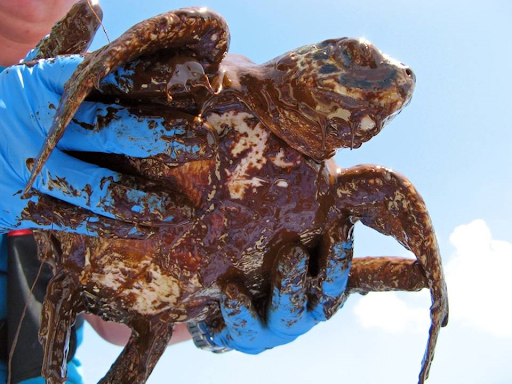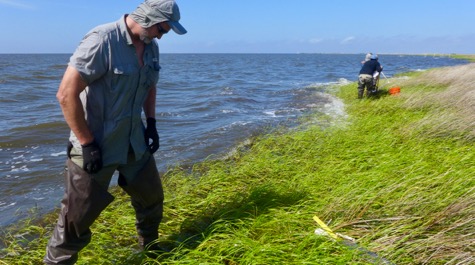Environment & Energy
Related: About this forumRemembering the 9th Anniversary of the Deepwater Horizon Oil Disaster
The Gulf of Mexico is more than oil and gasAs the Trump administration proposes to rollback regulations on offshore drilling, let’s take a look at why these safety measures were put in place to begin with.
Nine years ago, on April 20th, 2010, the Gulf of Mexico faced the most devastating environmental disaster in United States history. The BP Deepwater Horizon oil rig exploded 50 miles off the Louisiana coast, killing 11 people. An estimated 210 million gallons of oil and 1.8 million gallons of chemical dispersants seeped into the deep ocean, polluting the coast and the seafloor.
It wasn’t until five years later, in July of 2015, that BP finally agreed to pay a $20 billion settlement over 15 years.
The journey to that settlement was a hard one and often discouraging. Ocean Conservancy tracked and publicized the impacts of the oil on the Gulf and its wildlife, while BP spread lies that their oil disaster was “good for the Gulf.”
When the settlement was announced and BP was finally held accountable for its actions, our celebration was mixed with horror as we read the damage assessment—a full report on the extent of the oil impacts. Hundreds of thousands of sea turtles, marine mammals and birds died, along with trillions of larval fish. An area 20 times the size of Manhattan is still polluted and buried on the Gulf seafloor.
Much more: https://oceanconservancy.org/blog/2019/04/15/remembering-9th-anniversary-deepwater-horizon-oil-disaster/

© GREEN FIRE PRODUCTIONS

© BLAIR WITHERINGTON/FLORIDA FISH AND WILDLIFE CONSERVATION COMMISSION
NNadir
(33,528 posts)The reaction is totally muted and has more or less down the memory hole.
It didn't have the word "nuclear" in it. (If one looks though, one can learn that Gulf oil and gas does involve radioactive radioactive materials.)
Technologically Enhanced Naturally Occurring Radioactive Materials (TENORM) in the Oil and Gas Industry: A Review
Only nuclear energy is required to be perfect. All other forms of energy can kill at will, claiming vast rates of deaths in humans and other species if nuclear energy is not perfect.
Thanks to you though for remembering, even if it makes you an outlier.
Rhiannon12866
(205,552 posts)And the loved ones of those who were killed won't be forgetting anytime soon, either - not to mention that the photos of the wildlife, the effects on them are discussed in the article, should make anyone feel shocked and saddened. But you're right - how soon we forget. ![]()
Cetacea
(7,367 posts)Thanks for posting this. I remember complaining a lot back then about people in media substituting "marine mammals" for dolphins and whales, virtually the only mammals in that part of the gulf. I surmised at the time that editors were beholden to BP and were forbidden to mention the much beloved species in an attempt to mitigate a Public Relations nightmare.. A few years later Peter Fonda told a story about how he was visited by US Government Agents on the eve of a talking tour for his documentary on the crises. He was warned not to mention dolphins and whales as the US Government was in litigation with BP over damages.
Rhiannon12866
(205,552 posts)They stuck in your mind - as well as your user name. Since we know how close we are to these species, it makes sense that they'd play this down as much as possible - they only show happy ducklings cleaned with a little bit of Dawn. Thank you so much for the reminder - we must never forget and that's why I posted this article. It's slightly ahead of the actual anniversary, but I read this today and it brought it all back. I'm hoping that we see a lot more here on the actual anniversary. The effects will continue to be felt for years and we can never afford to forget. ![]()
![]()
Cetacea
(7,367 posts)I remember you as well!
![]()
![]()
OKIsItJustMe
(19,938 posts)
Salt Marsh Sampling Dr. Sean Graham of Nicholls State (L) prepares to sample the marsh soil within a Louisiana salt marsh as his students work in the background. © D. Johnson/VIMS.
by David Malmquist | April 18, 2019
Findings reveal that restoration of marsh vegetation is key to overall recovery
Nine years ago tomorrow—April 20, 2010—crude oil began leaking from the Deepwater Horizon drilling rig into the Gulf of Mexico in what turned out to be the largest marine oil spill in history. A long-term study suggests the oil is still affecting the salt marshes of the Gulf Coast, and reveals the key role that marsh grasses play in the overall recovery of these important coastal wetlands.
Conducting the study was a multi-institutional research team funded in part by the Gulf of Mexico Research Initiative, a 10-year independent program established through a $500 million financial commitment from BP. The team began sampling soon after the spill was finally contained, and continue their work today. Their most-recent article—in Estuaries and Coasts—reports on the first six and a half years of sampling post-spill.
Lead author on the study is John Fleeger, an emeritus professor at LSU. Co-authors are Rita Riggio, Irving Mendelssohn, Qianxin Lin, and Aixin Hou of LSU; David Johnson of William & Mary’s Virginia Institute of Marine Science; Donald Deis of Atkins North America; Kevin Carman of the University of Nevada-Reno; Sean Graham of Nicholls State University; and Scott Zengel of Research Planning, Inc.
Johnson, an assistant professor at VIMS and expert in salt-marsh invertebrates, says “Our study highlights the crucial role that plants play in the recovery of important links in the Gulf of Mexico’s coastal food web.” Those links ultimately connect to the fish and shellfish that support the region’s economy and culture.
…
